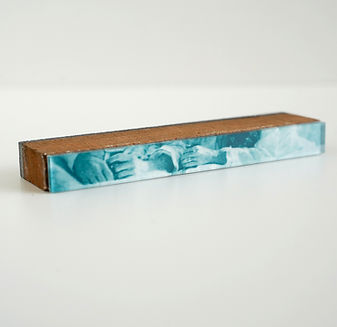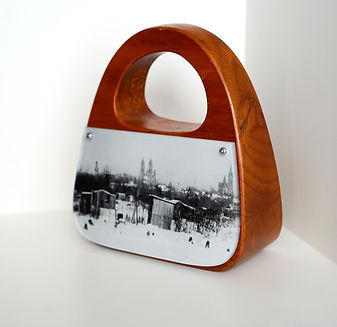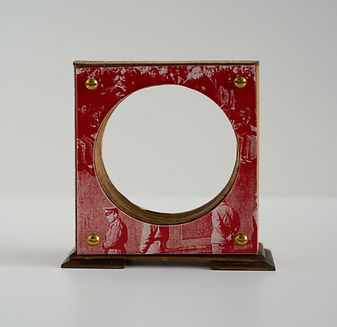20世紀のかけら
Fragments of the 20th Century

『20世紀のかけら』
-Fragments of the 20th Century-
昨年、オーストラリアのリサイクルショップで一冊のとても重くて分厚い本を買った。 “Chronicle of the 20th Century”という、20世紀の主要な出来事を総集したダイジェスト本で、前世紀末にいくつかの国で出版されている。
この本を材料に小作品をつくろうと日本に持ち帰り、8月に入って改めて本を開いた。すると中表紙に2000年3月28日の日付で、“Dear Dad, Happy 60th Birthday”と、父親の誕生日を祝う子供たちからの手書きのメッセージを見つけた。
その父親の生まれた1940年のページをめくってみると、惨たらしい写真の数々が目に飛び込んだ。100年分を一冊にまとめれば、戦争や殺戮、惨事ばかりが誌面を占めるわけで、人の世の非情、無情が今も終わらない戦争のニュースや原爆の日、終戦の日とも重なり、気が滅入ってつくるのが辛い日々が続いた。しかし、わたしの制作の苦闘などは、時代に翻弄される苦悩からすれば些末なもので、そもそも歴史と向き合うのが簡単であっていいはずがない。
わたしも今月、この本が贈られた主とおなじく60歳を迎える。ならば、この節目の夏に思い切り苦しんでみようと開き直った。足掻く過程も作品の一部だろう。
記事や写真を眺めても、知り得るのは史実のかけらにも満たないし真実にも近づけないだろう。それでも、そこに集められた20世紀の僅かな断片を、古びた小物や端材にそっとはめ込んでみる。すると歴史に堆積する記憶の粒子が、本の中でなく生きている私たちのそこここに、言葉にならないまま静かに宿って見える。
2024年8月 三田村光土里
"Fragments of the 20th Century"
Last year, I bought a very heavy, thick book at a secondhand shop in Australia. Titled Chronicle of the 20th Century, it’s a digest that compiles the major events of the 20th century and was published in several countries toward the end of the last century.
I brought the book back to Japan, intending to use it as material for a small piece. When I reopened it in August, I found a handwritten message on the inner title page dated March 28, 2000: “Dear Dad, Happy 60th Birthday”—a note from children celebrating their father’s birthday.
Curious, I turned to the page for 1940, the year that father was born, and was immediately struck by a flood of gruesome photographs. When a century’s worth of history is condensed into one volume, it naturally becomes dominated by war, slaughter, and catastrophe. The harshness and cruelty of human life weighed heavily on me, especially in a month that coincides with ongoing news of war, the anniversary of the atomic bombings, and the end of World War II. I found it difficult to create anything—my mood sank day after day. But I reminded myself that my own creative struggles are insignificant compared to the anguish of those who were tossed about by history. Facing history is never meant to be easy.
This month, I too will turn sixty—just like the father to whom this book was once gifted. So I resolved to embrace this milestone summer and allow myself to struggle through it. Perhaps the act of struggling itself becomes part of the work.
No matter how closely I examine its articles and photographs, I’ll never come close to understanding even fragments of historical fact, let alone truth. Still, I gently embed these tiny fragments of the 20th century into old trinkets and scraps. And when I do, the particles of memory layered within history seem to quietly inhabit not the pages of the book, but the spaces around us, the lives we live—silently, and beyond words.
August 2024 Midori Mitamura




















